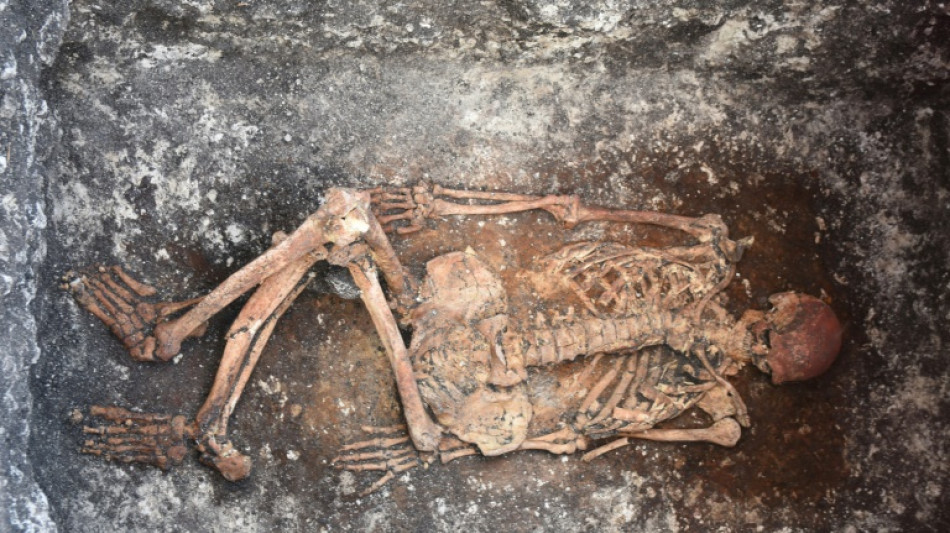
-
 Less Soviet, more inspiring: Kyrgyzstan seeks new anthem
Less Soviet, more inspiring: Kyrgyzstan seeks new anthem
-
Defending champion Kyren Wilson crashes out in first round of World Snooker Championship

-
 NASA's oldest active astronaut returns to Earth on 70th birthday
NASA's oldest active astronaut returns to Earth on 70th birthday
-
Exec linked to Bangkok building collapse arrested

-
 Zelensky says Russian attacks ongoing despite Putin's Easter truce
Zelensky says Russian attacks ongoing despite Putin's Easter truce
-
Vaibhav Suryavanshi: the 14-year-old whose IPL dream came true

-
 Six drowning deaths as huge waves hit Australian coast
Six drowning deaths as huge waves hit Australian coast
-
Ukrainian soldiers' lovers kept waiting as war drags on

-
 T'Wolves dominate Lakers, Nuggets edge Clippers as NBA playoffs start
T'Wolves dominate Lakers, Nuggets edge Clippers as NBA playoffs start
-
Taxes on super rich and tech giants stall under Trump

-
 Star Wars series 'Andor' back for final season
Star Wars series 'Andor' back for final season
-
Neighbours improvise first aid for wounded in besieged Sudan city

-
 Tariffs could lift Boeing and Airbus plane prices even higher
Tariffs could lift Boeing and Airbus plane prices even higher
-
Analysts warn US could be handing chip market to China

-
 Unbeaten Miami edge Columbus in front of big MLS crowd in Cleveland
Unbeaten Miami edge Columbus in front of big MLS crowd in Cleveland
-
Social media helps fuel growing 'sex tourism' in Japan

-
 'Pandora's box': alarm bells in Indonesia over rising military role
'Pandora's box': alarm bells in Indonesia over rising military role
-
Alaalatoa hails 'hustling hard' Brumbies for rare Super Rugby clean sheet

-
 Trio share lead at tight LA Championship
Trio share lead at tight LA Championship
-
Sampdoria fighting relegation disaster as old heroes ride into town

-
 Recovering pope expected to delight crowds at Easter Sunday mass
Recovering pope expected to delight crowds at Easter Sunday mass
-
Nuggets edge Clippers in NBA playoff overtime thriller, Knicks and Pacers win

-
 Force skipper clueless about extra-time rules in pulsating Super Rugby draw
Force skipper clueless about extra-time rules in pulsating Super Rugby draw
-
DEA MARIJUANA SCAM: As DEA Cannabis Program Implodes This 4/20, MMJ Stands Alone in Pursuit of Real Medicine

-
 Nuggets edge Clippers in NBA playoff overtime thriller, Pacers thump Bucks
Nuggets edge Clippers in NBA playoff overtime thriller, Pacers thump Bucks
-
Unbeaten Miami edge Columbus in front of big crowd in Cleveland

-
 Kim takes one-shot lead over Thomas, Novak at RBC Heritage
Kim takes one-shot lead over Thomas, Novak at RBC Heritage
-
Another round of anti-Trump protests hits US cities

-
 'So grateful' - Dodgers star Ohtani and wife welcome first child
'So grateful' - Dodgers star Ohtani and wife welcome first child
-
PSG maintain unbeaten Ligue 1 record, Marseille back up to second

-
 US, Iran report progress in nuclear talks, will meet again
US, Iran report progress in nuclear talks, will meet again
-
US Supreme Court intervenes to block Trump deportations

-
 Hamas armed wing says fate of US-Israeli captive unknown
Hamas armed wing says fate of US-Israeli captive unknown
-
Pacers thump Bucks to open NBA playoffs

-
 Sabalenka reaches Stuttgart semis as Ostapenko extends Swiatek mastery
Sabalenka reaches Stuttgart semis as Ostapenko extends Swiatek mastery
-
Zelensky says Ukraine will observe Putin's Easter truce but claims violations

-
 'Fuming' Watkins fires Villa in bid to prove Emery wrong
'Fuming' Watkins fires Villa in bid to prove Emery wrong
-
DR Congo boat fire toll revised down to 33

-
 England thrash Scotland to set up France Grand Slam showdown
England thrash Scotland to set up France Grand Slam showdown
-
Verstappen's Red Bull 'comes alive' to claim record pole in Jeddah

-
 McTominay fires Napoli level with Inter as Conte fuels exit rumours
McTominay fires Napoli level with Inter as Conte fuels exit rumours
-
Rajasthan unleash Suryavanshi, 14, as youngest IPL player but lose thriller

-
 Man City boost top five bid, Aston Villa thrash in-form Newcastle
Man City boost top five bid, Aston Villa thrash in-form Newcastle
-
Villa rout Newcastle to rekindle bid to reach Champions League

-
 Dumornay gives Lyon lead over Arsenal in Women's Champions League semis
Dumornay gives Lyon lead over Arsenal in Women's Champions League semis
-
Trans rights supporters rally in London, Edinburgh after landmark ruling

-
 'We have to wait': Barca's Flick on Lewandowski injury fear
'We have to wait': Barca's Flick on Lewandowski injury fear
-
Bordeaux-Begles backups edge Pau to close in on Top 14 summit

-
 Trans rights supporters rally outside in London, Edinburgh after landmark ruling
Trans rights supporters rally outside in London, Edinburgh after landmark ruling
-
PSG beat Le Havre to stay on course for unbeaten Ligue 1 season


Horseback riding may have begun 5,000 years ago in Europe: study
Who were the first people to ride horses?
Researchers believe they have found the earliest evidence of horseback riding, by the ancient Yamnaya people in Europe some 5,000 years ago.
Their conclusions, based on an analysis of human skeletal remains found in Bulgaria, Hungary and Romania, were published on Friday in the journal Science Advances.
Domestication of horses for milk is widely accepted to have begun around 3500 BC to 3000 BC, the study said, but the "origins of horseback riding remain elusive."
The researchers from the University of Helsinki and other European institutions date the earliest horsemanship to 3000 BC to 2500 BC among members of the Yamnaya culture.
"Our findings provide a strong argument that horseback riding was already a common activity for some Yamnaya individuals as early as 3000 BC," the researchers said.
Horse bones have been discovered in Yamnaya settlements but they are not as well preserved as human skeletons, which were given proper burials in earth-covered mounds known as "kurgans."
The researchers said the human skeletons provided the best source of information about horse riding because any riding tack used by early riders would have been made using perishable materials.
The researchers said some of the human skeletons they analyzed bore skeletal traits indicative of what they called "horsemanship syndrome."
"A skeleton of a living person is reacting," Martin Trautmann, a postdoctoral researcher at the University of Helsinki and one of the authors of the study, told AFP.
"If you sit on horseback you need to balance with every step of your mount, you need to cling tightly with your legs."
Doing that repeatedly leaves tell-tale changes in bone morphology, Trautmann said, including "stress-induced vertebral degeneration," a common ailment among avid horse riders.
"We know that saddles and stirrups dated much later," Trautmann said, and the early horse riders were probably riding bareback and gripping the mane of the horse.
- 'Cowboys, not warriors' -
Volker Heyd, a professor of archeology at the University of Helsinki, said the findings "fit very nicely into the overall picture" of Yamnaya culture.
"We were already suspecting them of using horses," Heyd said, and it could help explain the "exceptional" geographic expansion of their society in a few generations.
"It is difficult to envision how this expansion could have taken place without improved means of transport," the researchers said.
"Using horses for transport was a decisive step in human cultural development," they said.
"Trade and cultural exchange as well as conflicts and migrations leapt with the increase in speed and range provided by horsemanship."
The researchers said the Yamnaya were probably not initially using horses for warfare.
"They were cowboys, not warriors," said Trautmann.
Heyd said the early horse riders "were probably helping the Yamnaya people in guarding their animals, their cattle and sheep mostly."
According to the researchers, the earliest figurative evidence of horse riding comes from the Mesopotamian Ur III period shortly before 2000 BC through depictions of a horse and rider.
Images and mentions in cuneiform texts of horseback riding are also found in the Old Babylonian period from around 1880 BC to 1595 BC.
D.Moore--AMWN



